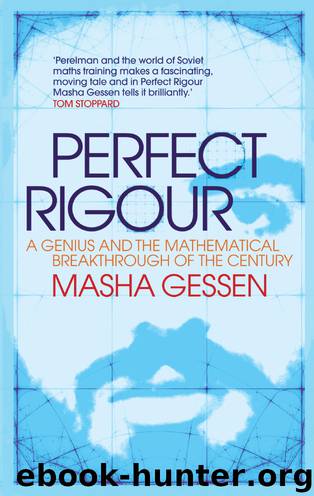Perfect Rigour by Masha Gessen

Author:Masha Gessen
Language: eng
Format: epub
Tags: mathematics, history of mathematics, world war ii, biography, science, engineering, military history
Publisher: Icon Books
Published: 2011-04-19T16:00:00+00:00
PERFECT RIGOR
THE PROBLEM
8
The Problem
THE VERY POSSIBILITY of mathematical science seems1 an insoluble contradiction.” So, more than a century ago, wrote Henri Poincaré, known among mathematicians as the last universalist, for he excelled in all areas of mathematics. If the objects of study are confined to the imagination, “from whence is derived that perfect rigor which is challenged by none?” And when rules of formal logic have replaced the experiment, “how is it that mathematics is not reduced to a gigantic tautology?” Finally, “are we then to admit that . . . all the theorems with which so many volumes are filled are only indirect ways of saying that A is A?”
Poincaré went on to explain that mathematics was a science because its reasoning traveled from the particular to the general. A mathematician who conducted his mental experiments with sufficient rigor could derive the rules that governed the rest of the imaginary terrain he shared with other mathematicians. In other words, he not only proved that A was A but also explained what made A quintessentially an A and where other A’s might be found or how they might be constructed. “We know what it is to be in love or to feel pain,2 and we don’t need precise definitions to communicate,” wrote an American mathematics professor who, after authoring many academic books, undertook to explain topology to a general audience. “The objects of mathematics lie outside common experience, however. If one doesn’t define these objects carefully, one cannot manipulate them meaningfully or talk to others about them.” This may or may not be so. Most of us are, in fact, perfectly satisfied with our casual understandings of distances long and short, of slopes smooth and steep, and of lines and circles and spheres. We’re satisfied with a gut feeling that puncturing a hole can sometimes but not always change the nature of an object—that is, a punctured balloon is entirely different from an intact one, while, say, a jelly-filled doughnut without a hole is, to us, essentially similar to a doughnut with a hole in the middle, with or without jelly. All of these things are in their simplest forms parts of our common experience. But in the disjointed world of the mathematician, shifting understandings and imprecise coordinates muddle the picture intolerably. In his world, nothing is like anything else unless proven similar; nothing is familiar until thoroughly defined; nothing—or very nearly nothing—is self-evident.
At the dawn of mathematics, Euclid attempted to start with things that were self-evident. He began his Elements with thirty-five definitions, five postulates, and five common notions, or axioms. Definitions ranged from that of a point (“that which has no parts, or which has no magnitude”3) to that of parallel straight lines (“such as are in the same plane, and which being produced ever so far do not meet”4). Then he made a series of statements such as “things that are equal to the same thing are equal to one another.”5 And the five postulates
Download
This site does not store any files on its server. We only index and link to content provided by other sites. Please contact the content providers to delete copyright contents if any and email us, we'll remove relevant links or contents immediately.
| Applied | Geometry & Topology |
| History | Infinity |
| Mathematical Analysis | Matrices |
| Number Systems | Popular & Elementary |
| Pure Mathematics | Reference |
| Research | Study & Teaching |
| Transformations | Trigonometry |
Modelling of Convective Heat and Mass Transfer in Rotating Flows by Igor V. Shevchuk(6423)
Weapons of Math Destruction by Cathy O'Neil(6252)
Factfulness: Ten Reasons We're Wrong About the World – and Why Things Are Better Than You Think by Hans Rosling(4726)
A Mind For Numbers: How to Excel at Math and Science (Even If You Flunked Algebra) by Barbara Oakley(3289)
Descartes' Error by Antonio Damasio(3263)
Factfulness_Ten Reasons We're Wrong About the World_and Why Things Are Better Than You Think by Hans Rosling(3224)
TCP IP by Todd Lammle(3170)
Fooled by Randomness: The Hidden Role of Chance in Life and in the Markets by Nassim Nicholas Taleb(3098)
Applied Predictive Modeling by Max Kuhn & Kjell Johnson(3053)
The Tyranny of Metrics by Jerry Z. Muller(3052)
The Book of Numbers by Peter Bentley(2957)
The Great Unknown by Marcus du Sautoy(2682)
Once Upon an Algorithm by Martin Erwig(2639)
Easy Algebra Step-by-Step by Sandra Luna McCune(2621)
Lady Luck by Kristen Ashley(2569)
Police Exams Prep 2018-2019 by Kaplan Test Prep(2532)
Practical Guide To Principal Component Methods in R (Multivariate Analysis Book 2) by Alboukadel Kassambara(2531)
All Things Reconsidered by Bill Thompson III(2383)
Linear Time-Invariant Systems, Behaviors and Modules by Ulrich Oberst & Martin Scheicher & Ingrid Scheicher(2357)
